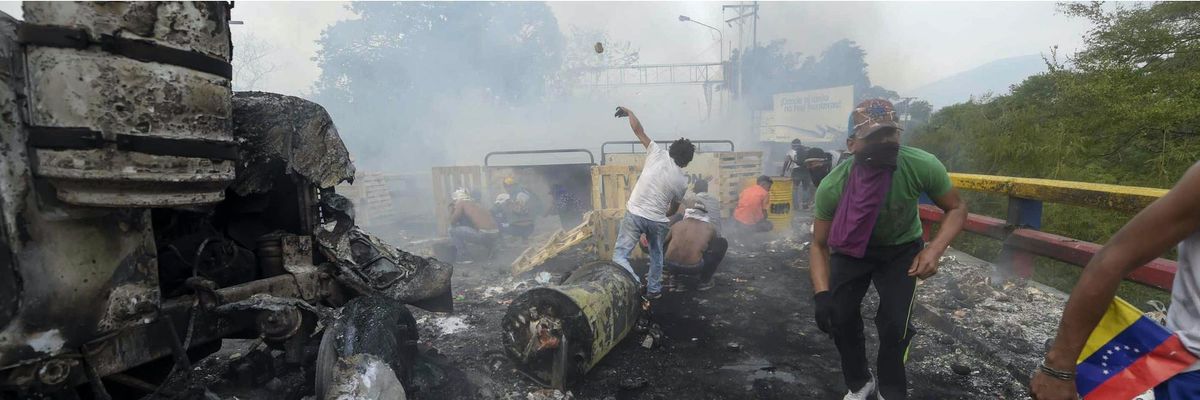Progressive observers of United States foreign policy in Latin America were unsurprised yet still expressed alarm Thursday over details in a new report from the U.S. Agency for International Development that shows the Trump administration's humanitarian aid to Venezuela was at least partially motivated by a desire for regime change in Caracas.
"You didn't need to be a genius to see the U.S. was trying to force a dramatic confrontation, rather than trying to efficiently help needy Venezuelans."
--Vincent Bevins, journalist
The report (pdf) published earlier this month by the USAID inspector general's office states that "the U.S. government's key foreign policy goals" in Venezuela following President Nicolas Maduro's 2018 reelection were to "increase pressure on Maduro to step down" and "support Guaido's legitimacy as the interim president," a reference to the unelected opposition leader Juan Guaido, who has also received a show of support from President Joe Biden.
"Accordingly, USAID prioritized aid to the Venezuelan people in coordination with the interim president, including issuing in-kind grants to distribute humanitarian commodities inside Venezuela," the report says. This included supporting an unnamed Venezuelan NGO perceived as aligned with U.S. foreign policy objectives despite not knowing "whether the organization had the capacity to comply with USAID's legal and financial requirements."
The IG investigation found that out of 368 metric tons of humanitarian aid designated for delivery to Venezuela by the agency, only eight metric tons arrived in the country, with the rest going to Colombia and Somalia. Aid that was sent to Venezuela arrived in military transport planes, a move the report says "was not justified by operational needs as commercial transportation was available and less expensive."
The report also acknowledges that the failed February 2019 aid convoy organized by U.S. special representative Elliott Abrams--whose history in the region includes using humanitarian aid flights to arm Contra terrorists in Nicaragua and covering up massacres committed by U.S.-backed death squads in Guatemala and El Salvador--"contributed to a tense environment for humanitarian assistance funded by or associated with the U.S. government, as the Maduro regime publicly rejected pre-positioned commodities and initiated security crackdowns in Venezuela."
Additionally, it states that USAID's own officials determined that food aid purportedly sent to alleviate child hunger "was unnecessary because the nutritional status of Venezuelan children did not warrant its use at the time."
USAID, "concerned that the United Nations supported the Maduro regime," also minimized funding for U.N. agencies even though some of them "had infrastructure in Venezuela to deliver humanitarian commodities."
This, at a time when a combination of increasing U.S. economic sanctions, corruption and mismanagement, low oil prices, and natural disasters reversed some of the tremendous progress made by the Bolivarian Revolution--which began with former President Hugo Chavez and continued under Maduro--in improving the lives of poor Venezuelans.
The new report surprised few seasoned observers of the more than 100-year history of U.S. meddling in Venezuelan affairs, a timeline that includes hundreds of millions of dollars in USAID funding--including nine-figure spending on groups opposing the Bolivarian Revolution. Still, the USAID IG report raised eyebrows.
"This was incredibly obvious at the time, but it's shocking to see the details," said U.S. journalist and author Vincent Bevins of the report's contents.
USAID itself has a long history of foreign interference and subversion around the world. The agency funded death squads in El Salvador and Guatemala's genocidal army during the 1980s, the forced sterilization of Indigenous Peruvian women in the 1990s, Laotian heroin traffickers during the Vietnam War--to name but a handful of examples. USAID operatives also taught torture and democracy suppression to security forces in Latin American dictatorships including Brazil, the Dominican Republic, and Uruguay in the 1960s and 1970s.
More recently, USAID in 2010 launched a social media campaign with the goal of sparking civil unrest against the Fidel Castro-led government in Cuba. Around the same time, the agency infiltrated Cuba's burgeoning hip-hop scene in a bid to foment a youth uprising.
